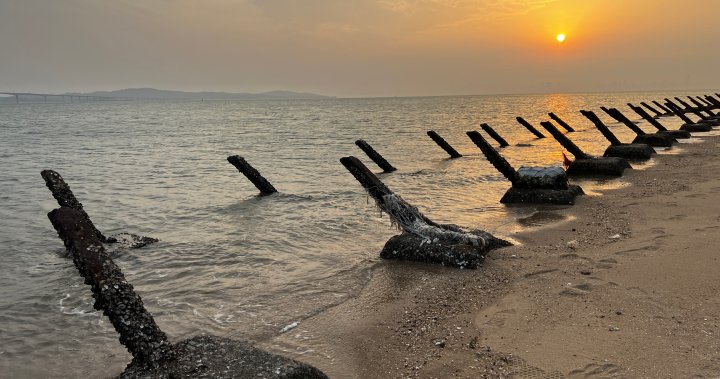Taiwan’s front line: Kinmen Island, scarred by civil war with China, braces as tensions build | Globalnews.ca
Wu Tseng-dong prides himself on making something good out of something terrible. The blacksmith runs a workshop on Taiwan’s Kinmen Island, where he forges household knives made from old Chinese bombs.
“Typically, the steel from these types of shells is of very good quality, so it is quite stable,” he explained, placing a panel into a fiery furnace before hammering it into shape.
Blacksmith Wu Tseng-dong forges household knives made from old Chinese artillery shells on Taiwan’s Kinmen Island.
Global News
Wu doesn’t need to worry about running short of raw materials. Dozens of artillery shells are piled high next to the furnace — some of the hundreds of thousands of Chinese bombs that landed on Kinmen decades ago.
“I was only a few months old when the artillery battle started, but the fighting continued for many years,” the 66-year-old told Global News.
Dozens of old artillery shells are piled high in Wu Tseng-dong’s workshop on Taiwan’s Kinmen Island. The Chinese military bombed the island hundreds of thousands of times, after it was separated from mainland China in 1949.
Jeff Semple / Global News
For seven decades, this small island of around 70,000 residents has been caught in the middle of a geopolitical power struggle. Kinmen is part of Taiwan, but is located hundreds of kilometres from Taipei, while just a few kilometres across the strait, visible through the haze, is mainland China.
In 1949, this island was the front line in a bloody civil war between the Communists and the Nationalists, which saw Kinmen separated from the Chinese mainland and become part of Taiwan.
The Nationalists fortified the island with as many as 100,000 soldiers, erecting hundreds of anti-landing stakes that still dot the coastline today, rusted and encrusted with barnacles.
Rusted anti-landing stakes dot the coastline of Taiwan’s Kinmen Island.
Jeff Semple / Global News
Wu said the fighting continued for 20 years. The Chinese military typically shelled the island at night — his family and others would squeeze together in cramped shelters and bunkers, waiting for the bombing to stop.
Now he fears, that dark chapter of history is poised to repeat.
“It is crucial that we strive to prevent any war,” Wu said. “It would bring great suffering to both sides.”
Blacksmith Wu Tseng-sharpens a knife made of steel from an old Chinese artillery shell.
Jeff Semple / Global News
The Chinese government has vowed to take Taiwan by force if necessary. U.S. intelligence reports claim the Chinese president has ordered the People’s Liberation Army to be prepared to invade by 2027. The military regularly runs drills rehearsing an invasion.
The vast majority of Taiwanese oppose joining China, but on Kinmen Island opinions are mixed.
Eighty-year-old Lu Bing-ding grew up during the Chinese bombing campaign, and his father fought the Chinese military, but he is undaunted by the prospect of a Chinese military invasion, believing Kinmen would be spared.
“If the Communists are coming, let them come,” he said.
“Chinese and Taiwanese people are the same. We have the same ancestors and language. Chinese people will no longer fight their own people.”
That affinity is also explained by necessity. Beijing recently started supplying drinking water to stabilize the island’s supply. A daily ferry service now shuttles passengers back and forth to China, and Chinese tourists and businesses provide an economic lifeline.
The Chinese city of Xiamen is visible through the haze, located just three kilometres across the strait from Kinmen Island, Taiwan.
Jeff Semple / Global News
“A significant portion of Kinmen’s economy relies on tourism and small-scale trade with China,” said Li Hou-lun, who represents Taiwan’s ruling party, the DPP, in Kinmen. “They want Taiwan to have a friendlier relationship with China.”
But closer ties with Communist China don’t mean Kinmen’s residents are willing to sacrifice their democratic freedoms.
Every day, a loud three-storey speaker perched on a cliff overlooking the coast broadcasts music across the water to the Chinese city of Xiamen. The song, by the late Taiwanese singer and pro-democracy activist Teresa Teng, is followed by a message:
“It is my fervent hope that our fellow citizens on mainland China can enjoy the same democracy and freedom that we have here,” the broadcast says.
A loud three-storey speaker is perched on a cliff overlooking the coast of Kinmen Island, Taiwan. Every day, it broadcasts pro-democracy messages and music across the water to the Chinese city of Xiamen.
Jeff Semple / Global News
Jessica Chen represents Kinmen County as a member of the centre-right Kuomintang political party in Taiwan’s Legislative Yuan. She said her constituents want to maintain their democratic rights while also fostering closer ties with China.
She rejects suggestions that those aspirations are naive in the face of threatening rhetoric from the Chinese government and believes Kinmen stands as an example to both Taipei and Beijing.
“We should communicate more with Chinese people and pursue peaceful activities, instead of shouting at each other all the time,” Chen said, adding she does not believe a Chinese invasion is inevitable.
A network of tunnels stretching more than 1,300 metres long runs beneath the city on Kinmen Island in Taiwan. The tunnels were built to shelter residents from Chinese artillery in the 1970s.
Jeff Semple / Global News
Kinmen’s unique perspective is informed, not only by its close proximity to the Chinese mainland, but also by its wartime history.
“This island, I think more than Taiwan, (the people) experienced real war. It was a battlefield. People died. Their homes were ruined,” she said.
“We understand there’s no winner during war and there’s no loser with peace.”
For all the latest world News Click Here




